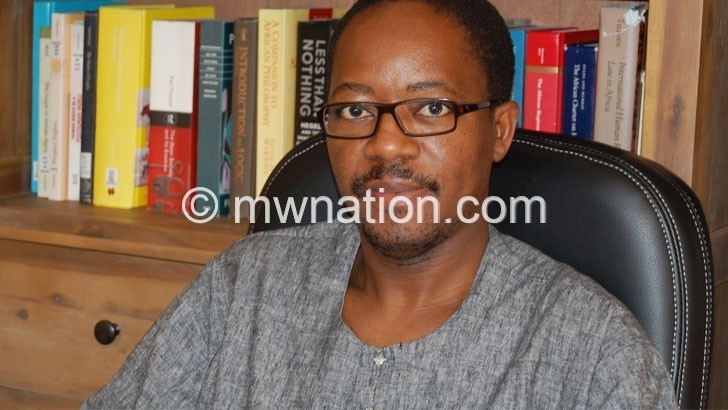Legal minds differ on MRA appointments
There are mixed opinions on the recent appointments of Malawi Revenue Authority (MRA) commissioners, with some legal minds saying the decision was illegal while others say it was a necessary breach of law.
But government has insisted there is no breach of law with the appointments.
Last Wednesday Chief Secretary to Government Zangazanga Chikhosi announced that President Lazarus Chakwera had appointed John Biziwick as commissioner general and two deputies Henry Ngutwa, responsible for revenue, and Agnes Katsonga to head administration.
But on Friday Chakwera said the appointment was on acting capacity “to stop free-for-all pilferage of taxes and destruction of evidence that have been taking place there in the last weeks”.

The President, however, pended the appointment of Deputy Inspector General of Police whose appointment was equally done outside the law.
Information sourced from MRA website shows that Biziwick, who has taken the position for a second time, reported for duties on Monday.
In both his Facebook post and interview with The Nation yesterday, professor of law at the University of Cape Town Danwood Chirwa argued that the MRA appointments are illegal and hence whatever decisions the commissioner general makes now will be invalid.
He said: “As Biziwick’s appointment is unlawful, he cannot take any valid decisions, whether these are decisions concerning MRA employees or tax-related decisions affecting taxpayers. He can also not bind the MRA in transactions involving third parties. So, we have a critical institution over which the cloud of illegality hovers. There’s is no justification for knowingly dragging a whole institution down the path of illegality.”
Put to him that the President had made the appointments to stop fraud, Chirwa said investigators could have done the job if crime was being committed at MRA.
He explained: “Investigators are the authorised agencies to combat crime. Now there are unauthorised individuals who are probably tampering with the crime scene and documents. This doesn’t aid the effort to reboot and start on a clean state of lawfulness.”
But in a separate interview, University of Malawi’s Chancellor College dean of law Sunduzwayo Madise said in an ideal situation, the commissioners should be appointed by the board but in the absence of one, the President was justified to make the appointments.
He said if the appointments or the decisions of the appointees were questioned in a court of law, one may apply the doctrine of necessity, adding that in the absence of such a challenge, the decisions are valid.
Said Madise: “Strictly speaking, the President flouted the law. But I found his decision reasonable. There is no board, yes but then should we allow wrong things to go on at MRA? I would say no. So, I personally think the decision was in good faith and the courts may have to consider this if there was a challenge.”
Section 17 (1&2) of the MRA Act empowers the board to make the appointment of the Commissioner General with approval from the minister and the board to appoint deputy commissioners.
Two weeks ago, in what appears to be a clean-up exercise, the new administration dissolved boards of 67 parastatals including MRA, with an additional three boards being added to the list on Wednesday. The absence of the board is what led to breach of law in appointing MRA commissioners.
When contacted yesterday, Minister of Information, who is also government spokesperson, Gospel Kazako said there was no breach of law as the commissioners have been appointed on acting capacity.
He said once the board is in place the appointments will be regularised.
Said Kazako: “People must appreciate that the appointments were necessary to save the country from further plunder.”
Meanwhile, corporate governance experts Kamwachale Khomba and John Kamanga have in separate interviews appealed to government to expedite the appointment of parastatal boards so that key operations are not affected.
Said Kamanga: “I hope they will make appointments for boards as soon as possible, especially for key organisations such as Mera [Malawi Energy Regulatory Authority] and MRA who may need the board for certain crucial decisions. The appointments are in the interest of good corporate governance.”
On his part, Khomba, who has sat in over five public boards, added that when making board appointments, government should consider merit and not appeasement.
“Only people who can add value should be considered for such appointments,” he said.
Kazako could not indicate how soon the board appointments will be made, saying: “We want to come up with boards people can trust. There will be thorough scrutiny but I can assure you this will be done as soon as the process of scrutinising names is done.”





